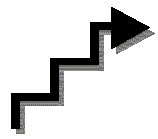
Steps Leading to a Straight Line: Constructing a Variable

|
Social science involves the study of variables and the aspects, attributes, events, and behaviors that compose it. In social science, we move from ideas and observations to counts, measures, and predictions. The main idea, event, activity, behavior, or dimension on which we focus our observations we call our "variable."
A variable "varies" - the main idea stays the same, but its range of attributes can be arranged along a single line. There can be more of it or less of it. It can be weaker or stronger, smaller or larger, sicker or healthier, pro-something or anti-something. We study a variable because we want to measure its range and study the effects of other events on that range.
1. Can you describe your variable in just a few words, e.g., "patient progress after a certain treatment," or "people's attitudes toward politics?"
_______________________________________________________________________________________
_______________________________________________________________________________________
2. What theory or ideas underlie your research interest and your selection of a variable?
_______________________________________________________________________________________
_______________________________________________________________________________________
3. Think about what a "low performer" would be on your variable scale. Describe the kind of person, events, behaviors, etc., which would be at the beginning, or lowest end of your variable scale.
_______________________________________________________________________________________
_______________________________________________________________________________________
4. Describe a "high performer," a person, event, set of behaviors, etc., that would be at the highest end of your variable.
_______________________________________________________________________________________
_______________________________________________________________________________________
5. This is the hardest. Describe persons, events, etc. that would be in the middle range of your variable scale.
_______________________________________________________________________________________
_______________________________________________________________________________________
6. Here (or on a separate sheet) write three items exemplifying the high, middle, and low range of your variable. (You may already have survey items from your ongoing research.) Number each item.
High end items (hard to agree with)
_______________________________________________________________________________________
_______________________________________________________________________________________
Middle range items
_______________________________________________________________________________________
_______________________________________________________________________________________
Low end items (easy to agree with)
_______________________________________________________________________________________
_______________________________________________________________________________________
7. Below is a horizontal line representing your variable. Mark the end points in a way appropriate to your variable, e.g., less - more, easy - hard, sick - healthy. Arrange your items (by their numbers) along this variable line where you think they belong. (In other words, how do you think respondents will react to your items?) If you have trouble figuring out where an item belongs on the line, consider whether it is actually targeted on your variable.
You now have the framework for building an instrument with a linear array of hierarchical survey items that will elucidate your variable.
Marci Enos' Handout for Ben Wright's Questionnaire Design class, U. Chicago, 2000
Steps Leading to a Straight Line: Constructing a Variable. Enos M. … Rasch Measurement Transactions, 2008, 22:1 p. 1155
| Forum | Rasch Measurement Forum to discuss any Rasch-related topic |
Go to Top of Page
Go to index of all Rasch Measurement Transactions
AERA members: Join the Rasch Measurement SIG and receive the printed version of RMT
Some back issues of RMT are available as bound volumes
Subscribe to Journal of Applied Measurement
Go to Institute for Objective Measurement Home Page. The Rasch Measurement SIG (AERA) thanks the Institute for Objective Measurement for inviting the publication of Rasch Measurement Transactions on the Institute's website, www.rasch.org.
| Coming Rasch-related Events | |
|---|---|
| May 17 - June 21, 2024, Fri.-Fri. | On-line workshop: Rasch Measurement - Core Topics (E. Smith, Winsteps), www.statistics.com |
| June 12 - 14, 2024, Wed.-Fri. | 1st Scandinavian Applied Measurement Conference, Kristianstad University, Kristianstad, Sweden http://www.hkr.se/samc2024 |
| June 21 - July 19, 2024, Fri.-Fri. | On-line workshop: Rasch Measurement - Further Topics (E. Smith, Winsteps), www.statistics.com |
| Aug. 5 - Aug. 6, 2024, Fri.-Fri. | 2024 Inaugural Conference of the Society for the Study of Measurement (Berkeley, CA), Call for Proposals |
| Aug. 9 - Sept. 6, 2024, Fri.-Fri. | On-line workshop: Many-Facet Rasch Measurement (E. Smith, Facets), www.statistics.com |
| Oct. 4 - Nov. 8, 2024, Fri.-Fri. | On-line workshop: Rasch Measurement - Core Topics (E. Smith, Winsteps), www.statistics.com |
| Jan. 17 - Feb. 21, 2025, Fri.-Fri. | On-line workshop: Rasch Measurement - Core Topics (E. Smith, Winsteps), www.statistics.com |
| May 16 - June 20, 2025, Fri.-Fri. | On-line workshop: Rasch Measurement - Core Topics (E. Smith, Winsteps), www.statistics.com |
| June 20 - July 18, 2025, Fri.-Fri. | On-line workshop: Rasch Measurement - Further Topics (E. Smith, Facets), www.statistics.com |
| Oct. 3 - Nov. 7, 2025, Fri.-Fri. | On-line workshop: Rasch Measurement - Core Topics (E. Smith, Winsteps), www.statistics.com |
The URL of this page is www.rasch.org/rmt/rmt221f.htm
Website: www.rasch.org/rmt/contents.htm